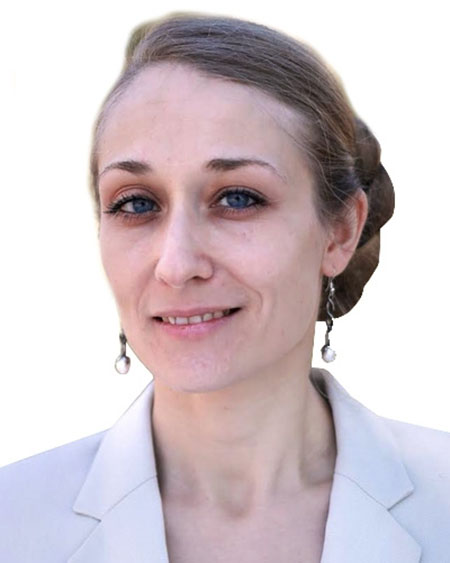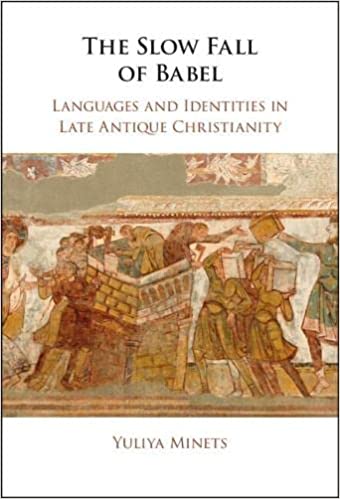History Professor Traces the Evolution of Linguistic Thought in New Book
02/03/2022
by Brett Buckner
For Yuliya Minets, the publication of her first book became a journey of self-discovery and understanding.
 The Ukrainian-born assistant professor of ancient history spent several years researching and writing “The Slow Fall of Babel” – a process that taught her as much about herself as it did about the ways ancient Christians experienced and conceptualized their linguistic differences.
The Ukrainian-born assistant professor of ancient history spent several years researching and writing “The Slow Fall of Babel” – a process that taught her as much about herself as it did about the ways ancient Christians experienced and conceptualized their linguistic differences.
“It was a transformative experience for me,” explained Minets, who joined the JSU faculty in 2020. “It helped me gain confidence in myself. I was once very shy of my accent and worried how an outsider like me can have a successful academic career in this country.”
But writing “The Slow Fall of Babel” changed all of that.
“It made me proud of who I am and where I came from,” Minets continued. “It also made me more tolerant and open. Along with race and gender, language often provides us with lenses to easily see people’s differences and to easily judge them without appreciating the challenges they face. I’m now more aware of the biases based on the way people speak and I’m well-equipped to cut off the occasional instances of language-related microaggression and toxic reactions.”
In biblical literature, the Tower of Babel was built in Babylonia after the Great Flood. In Genesis 11: 1-9, the Tower of  Babel is used to explain the existence of diverse languages. According to Genesis, the Babelites wanted to make a name for themselves by building a mighty city and a tower that reached to the “top in the heavens.” God disrupted the work by confusing the language of the workers, so they could no longer understand one another. The city was never completed, and the people scattered across the earth.
Babel is used to explain the existence of diverse languages. According to Genesis, the Babelites wanted to make a name for themselves by building a mighty city and a tower that reached to the “top in the heavens.” God disrupted the work by confusing the language of the workers, so they could no longer understand one another. The city was never completed, and the people scattered across the earth.
This familiar story may have been inspired by the Babylonian tower temple north of the Marduk temple, which in Babylonian was called "Bab-ilu" – which translates to “Gate of God.” The similarity in pronunciation of "Babel" and "balal" - “to confuse” in Semitic languages – led to the play on words in Genesis 11:9: “Therefore, its name was called Babel, because there the Lord confused the language of all the earth.”
In Minets’ book, Babel stands as a metaphor for the graduate process of learning to appreciate linguistic diversity and to see the world in all its multilingual diversity – the process that involved intellectual and political elites in the late antique Mediterranean.
“The gradual erosion of this vision is the slow fall of Babel that took place in the hearts and minds of a good number of early Christian writers and intellectuals who represented various languages and literary traditions,” Minets states in the introduction. “This step-by-step process included a more conscious discovery and internalization of the fact of the existence of multiple other languages in the world, as well as subsequent attempts to incorporate their speakers meaningfully into the holistic and distinctly Christian picture of the universe.”
When approaching the writing of “The Slow Fall of Babel,” one of Minets’ main objectives was to define and understand the audience she was writing for. In the end, she wanted her book to appeal not only to academics but also to those curious about languages, identities and early Christianity.
“I like to think of my book as being user-friendly,” she said. “I can easily see how this book could be used for upper-level college classes in religion or cultural studies, but those who are just interested in the topic would be able to read my book without constant Googling of unfamiliar terms or checking a basic textbook.”
Beyond its academic relevance, Minets’ had a deeper goal.
“I wanted this book to help us see the way we perceive and conceptualize languages, and how social-cultural stereotypes are involved in the way we see people who speak with foreign or local accents,” she said. “We are a globalized culture. Language connects us to different places. By speaking in a foreign language, you’re still inhabiting your homeland. Regardless of the language you speak, your accent becomes part of your identity. It testifies to who you are, where you’ve came from, and what you’ve been through.”

